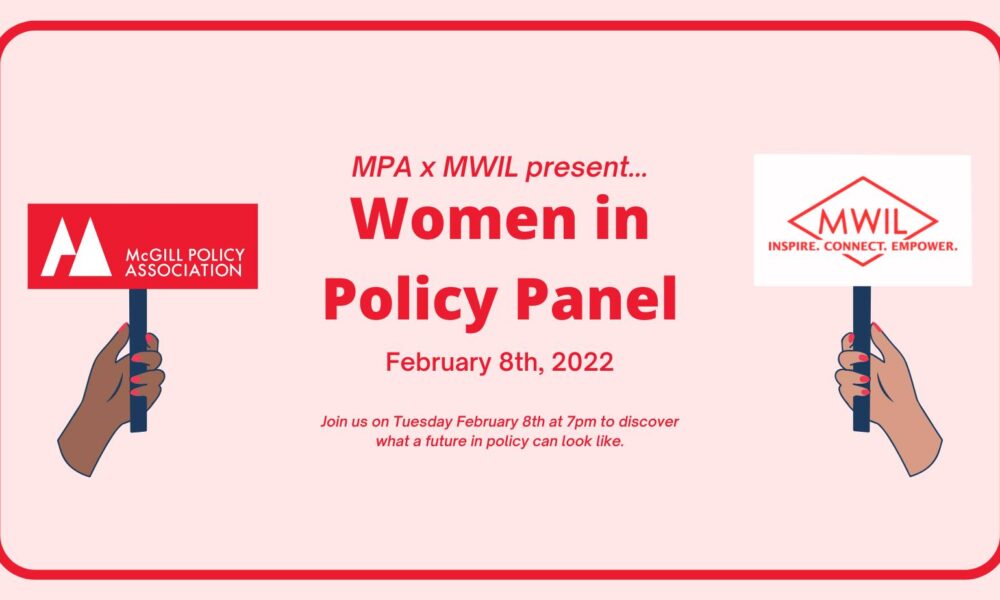On Feb. 8, the McGill Women in Leadership (MWIL) and the McGill Policy Association (MPA) collaborated in hosting a virtual panel titled “Women in Policy.” The event featured three panelists: Nirushaa Senthilnathan, a senior policy analyst at Canada Mortgage and Housing Corporation (CMHC); Maeva Vilain, the borough councillor for the district of Jeanne-Mance; and Muna Tojiboeva, a current law student at McGill, former Parliament Hill staffer, and previous Students’ Society of McGill University (SSMU) president.
After outlining their individual career journeys, the speakers shared the obstacles they faced in politics and policymaking, offering hard-earned advice to students who wish to pursue similar paths. Senthilnathan spoke about how her identity as a woman and a daughter of refugees helped her pave her path in policymaking.
“One major challenge I can think of is […] learning how to navigate systems that we are unfamiliar with,” Senthilnathan said. “It sometimes felt like we were never told the rules of the game that we were playing so we had to figure out what that was very quickly.”
Senthilnathan received her bachelor’s degree in psychology from McGill in 2015 and is a 2020 graduate of McGill’s Max Bell School of Public Policy. As the president and co-founder of the McGill Alumni Public Policy Society (MAPPS), Senthilnathan delved into the importance of forming connections with people in her professional life, encouraging audience members to get involved in groups they find interesting after university.
“My brother and I […] grew up with mostly people who were in blue-collar and service-sector jobs which meant that we didn’t have any contacts or mentors within the professional sector spaces,” Senthilnathan said about breaking into the field. “Oftentimes [jobs] aren’t posted [….] You have to go through certain networks, so if you think that you can apply to a hundred jobs into a black box and never talk to anyone, that’s not the way for you to be successful.”
Vilain, as an elected official, noted that a supportive workplace helps ease the sometimes stressful transition into the field.
“What helped me a lot was when I decided to be a candidate with Projet Montreal, there was a very, very clear equity policy [….] They wanted women to win their elections,” Vilain said. “My party, I would say, was a feminist party. It understood the importance of having women.”
Tojiboeva spoke of her experiences as a young woman working on Parliament Hill, where she often struggled with ageism and feelings of imposter syndrome, and offered advice on how to overcome such challenges.
“If you’re a young political staffer, especially if you’re a young political staffer from an immigrant background who doesn’t know any other political staffers […] sometimes it feels like all of this policy and all of this responsibility […] is on your shoulders,” Tojiboeva said. “I would be reaching out to other people either for help or for support and it’s not a failure to do that.”
All the panellists agreed that fatigue from facing bureaucratic obstacles was a common experience among many women in policy.
“More often than not, government is very slow, it’s bureaucratic,” Tojiboeva said. “It takes a lot of bandwidth out of you and you have to know what to prioritize and where to let go.”
Lis Riveros, U1 Arts and vice-president of Events for MWIL, helped organize the event. For Riveros, it was important to see women at varying life stages represented on the panel—and in the policymaking field at large.
“People attending the panel see people like Maeva and they think, ‘Okay, I can be […] a mother and still be able to take on such a large position,’” Riveros said. “But it’s also impressive to see people like Muna who are so fresh out of McGill being able to take on such a large challenge.”
Co-executive directors of the MPA, Michelle Marcus, U2 Arts, and Matthew McLaughlin, U3 Arts, hope that attendees walk away from the panel feeling inspired and excited to enter the field.
“We started thinking that we could really partner and create an opportunity for women and for female McGill students to really hear from some women who have been invested in the realm of policy,” Marcus said. “I think it’s really important that there are specific outlets and opportunities for [female-identifying students] to hear from female role models and women who have pursued careers in areas they are interested in.”









